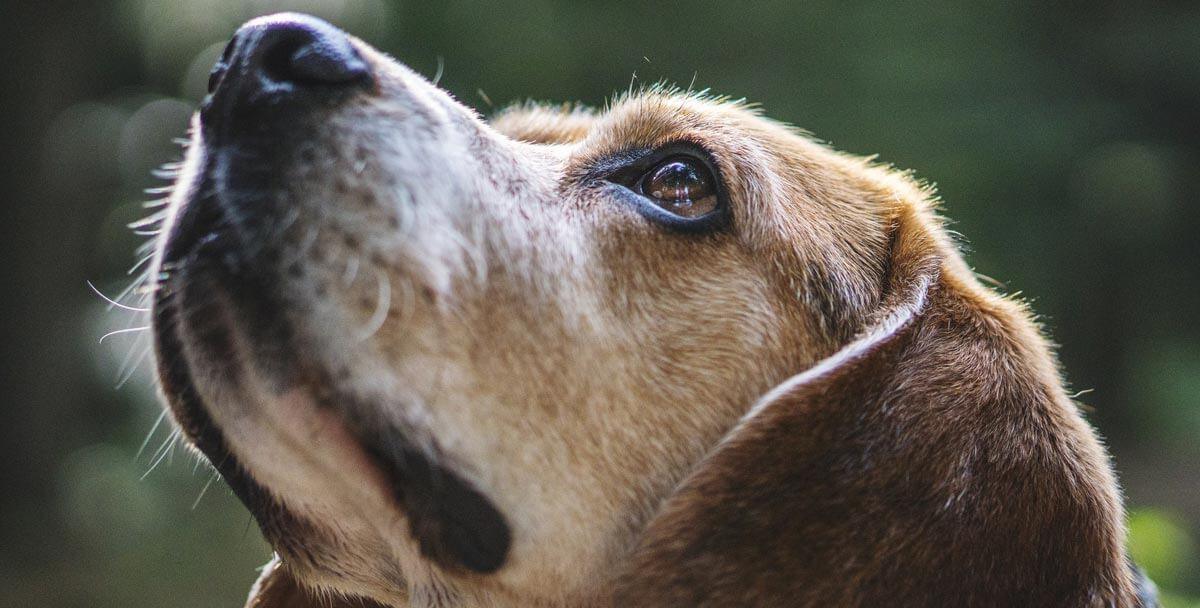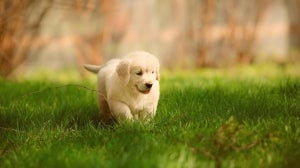
Whether your dog is still a puppy or already an adult, it is important to have an idea of his or her expected size and weight when they are fully grown.
Not only is this useful to know before adopting a specific breed (large breeds need more space, smaller breeds tend to live longer, etc.), but this information has a strong influence on what you should feed your dog. For example, small breeds, generally considered to be 10kg or less, have much less growing to do than medium-sized or large breeds.
Consequently, they need less energy, so small breed dog food reflects this and provides them only with the nutrients they require to stay healthy. Conversely, large breeds, which are considered to be 25kg or more (but see the chart below for a more accurate breed-by-breed interpretation), have the most growing to do, so they need large breed dog food to get all the energy they must consume to grow at such a rapid rate.
For this reason, many dog food products have a breed size indicator on the packaging, letting you know if it is suitable for small, medium, large and even extra-large breeds. Feeding a dog food intended for a different-sized breed will result in nutritional imbalances. This can lead to long-term growth and health issues, such as obesity. Keeping a close eye on your dog’s weight can extend their life span. Thus, it is important you know the eventual size of your dog, so you can buy the right food for him or her and help keep them at their ideal and healthiest weight.
How much should my dog weigh?
Every dog is different and, no matter how well you feed your puppy, some dogs won’t grow to be as big or as heavy as others of the same breed. Conversely, some may become much larger. However, there are two reasonably reliable ways of estimating how large your dog will become.
Observing the size and weight of your puppy’s parents
Looking at the average weight of adult dogs of the same breed and sex as your puppy
For some owners, particularly if your dog is a rescue, you may not know the parents, so the former is not an option. However, if you adopted your puppy from a breeder, or the kennel has records of the mother, someone can probably inform you of the size and weight the mother grew to. It can sometimes be harder to find records on the father, unless the pregnancy was planned and arranged. However, even without knowing the size and weight of the parents, most dogs grow to more or less the average size of other dogs of the same breed.
The chart below lists some of the UK’s most common dog breeds, their average adult weight when fully grown based on sex, and the size category they have been determined by The Kennel Club, the UK’s governing body for canines. That being said, there are a multitude of factors which can influence a healthy weight for your dog. Some dogs build muscle more easily and so weigh more, while others can be lighter while still being of healthy size and weight.
If your dog falls outside the average weights listed below but they otherwise appear healthy, they probably are. If you want to be sure, book an appointment to have a check-up with your vet.
|
Breed
|
Average Adult Weight (kg) |
Size
|
|
|---|---|---|---|
| Male | Female | ||
| Affenpinscher | 3-5 | Small | |
| Afghan Hound | 25-30 | 20-25 | Large |
| Akita | 40-50 | 30-40 | Large |
| Alaskan Malamute | 38-40 | 35 | Large |
| Anatolian Shepherd Dog | 40-70 | Large | |
| Australian Cattle Dog | 15-20 | Medium | |
| Australian Shepherd | 20-30 | 20-25 | Medium |
| Australian Silky Terrier | 3-5 | Small | |
| Australian Terrier | 5-7 | Small | |
| Basenji | 10 | Small | |
| Basset Hound | 20-25 | Medium | |
| Bavarian Mountain Hound | 20-25 | Medium | |
| Beagle | 8-14 | Small | |
| Beauceron | 30-40 | Large | |
| Bedlington Terrier | 7-10 | Small | |
| Belgian Shepherd Dog | 25-30 | 20-25 | Medium |
| Bergamasco | 32-38 | 26-32 | Large |
| Bernese Mountain Dog | 40-55 | 30-45 | Large |
| Bichon Frise | 5-7 | 4-7 | Small |
| Black and Tan Coonhound | 25-35 | Large | |
| Bloodhound | 30-35 | 25-30 | Large |
| Bolognese | 2.5-4 | Small | |
| Border Terrier | 5-7 | Small | |
| Borzoi | 35-48 | 27-38 | Large |
| Boston Terrier | 4-11 | Small | |
| Boxer | 30-37 | 22-30 | Large |
| Bracco Italiano | 25-40 | Large | |
| Briard | 35-45 | 20-30 | Large |
| Brittany | 13-18 | Medium | |
| Bull Terrier | 28-32 | 20-28 | Medium |
| Bullmastiff | 50-60 | 45-55 | Large |
| Cairn Terrier | 5-7 | Small | |
| Cavalier King Charles Spaniel | 5-9 | Small | |
| Cesky Terrier | 7-10 | Small | |
| Chihuahua | 2.5 | Small | |
| Chinese Crested | 2-6 | Small | |
| Chow Chow | 20-30 | Medium | |
| Collie | 27-32 | 22-30 | Medium |
| Coton De Tulears | 4-6 | 3.5-5 | Small |
| Dachshund (Miniature) | 5 | Small | |
| Dachshund (Standard) | 7-14 | Medium | |
| Dalmatian | 20-25 | Medium | |
| Dandie Dinmont Terrier | 8-11 | Small | |
| Deerhound | 39-50 | 34-43 | Large |
| Dobermann | 30-40 | Large | |
| Dogue de Bordeaux | 50 | 45 | Large |
| English Setter | 27-30 | 22-25 | Large |
| English Toy Terrier | 3.5-6.5 | Small | |
| Entlebucher Mountain Dog | 20-30 | Medium | |
| Estrela Mountain Dog | 40-50 | 30-40 | Large |
| Eurasier | 23-32 | 18-26 | Medium |
| Finish Lapphund | 15-24 | Medium | |
| Fox Terrier | 7.5-8.5 | 6.5-7.5 | Small |
| Foxhound | 29-34 | 20-29 | Large |
| French Bulldog | 12.5 or less | Small | |
| German Longhaired Pointer | 27-32 | Large | |
| German Pinscher | 11-16 | Medium | |
| German Shepherd | 35-45 | Large | |
| German Shorthaired Pointer | 25-30 | 20-25 | Medium |
| Giant Schnauzer | 27-48 | 25-35 | Large |
| Gordon Setter | 25-35 | 20-30 | Large |
| Great Dane | 60-80 | 50-70 | Large |
| Great Swiss Mountain Dog | 50-65 | 40-50 | Large |
| Greenland Dog | 30-32 | Large | |
| Greyhound | 29-32 | 27-30 | Large |
| Griffon Bruxellois | 4-5 | Small | |
| Hamiltonstovare | 23-27 | Medium | |
| Havanese | 3-6 | Small | |
| Hovawart | 25-40 | Large | |
| Hungarian Kuvasz | 45-52 | 35-40 | Large |
| Hungarian Puli | 13-15 | 10-13 | Medium |
| Ibizan Hound | 23 | 20 | Medium |
| Irish Red & White Setter | 25-34 | Large | |
| Irish Setter | 32 | 27 | Medium |
| Irish Terrier | 12 | 11 | Small |
| Irish Wolfhound | 54 or more | 47 or more | Large |
| Italian Greyhound | 3-7 | Small | |
| Italian Spinone | 34-39 | 29-34 | Large |
| Jack Russell Terrier | 7-8 | Small | |
| Japanese Akita Inu | 34-54 | 32-45 | Large |
| King Charles Spaniel | 4-7 | Small | |
| Komondor | 36 | 31 | Large |
| Kooikerhondje | 9-11 | ||









